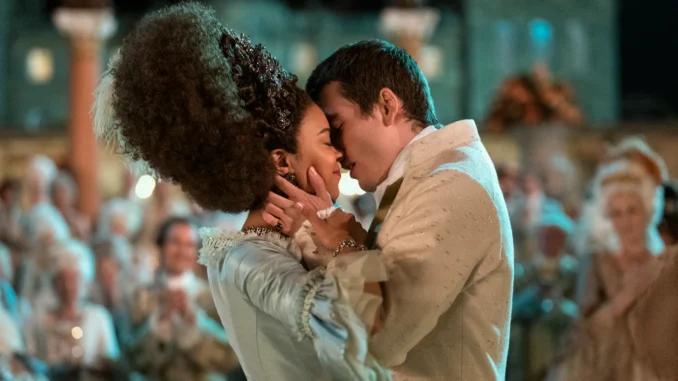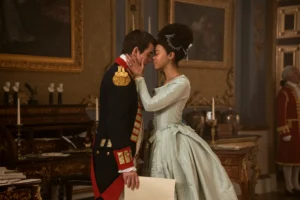
What could have been.
Queen Charlotte: A Bridgerton Story shows us what it really means to love someone in sickness and in health.
When Charlotte arrives in the English capital ahead of her wedding to King George III, she is unaware of the heartbreak and horror that await her. The 17-year-old, who is soon to be queen consort, knows not of the torment George has long endured and will continue to endure until his dying day – and she knows not of the sorrow that awaits her as a consequence of being his devoted wife.
We, by contrast, know how their story ends. Unlike the young lovers in Bridgerton, there will be no happily ever after for Charlotte and George. As the king’s grip on reality loosens, his condition worsening with time, their shared moments will grow few and far between. Not only will they lead increasingly separate lives from one another, but the need to keep the truth under lock and key for fear of jeopardising the crown means they must suffer in silence, shouldering their burden alone.
When Charlotte learns she is to marry the British head of state, she is deeply frustrated – and understandably so. Her life has been mapped out without even a fleeting consideration for her own dreams and desires. Her personhood has, in many ways, been erased and instead, she is merely a means to an end: binding her nation to the United Kingdom and securing its future.
How she feels about her husband-to-be – the man she will be tied to for the rest of her life, the man she must be intimate with in order to fulfil her number one duty: producing an heir – is entirely irrelevant, which is why she meets him for the first time on their wedding day. No need for prior introductions and test runs. The political arrangement is not up for debate.
And yet, when they do eventually look into one another’s eyes in the palace garden, there is an instant spark. They are immediately drawn to one another, their connection transcending the physical – although that is clearly there too – as they take one another in for the very first time. Their interaction is playful, warm and tender as we, too, fall in love with the moment unfolding before us. We later learn that George was on the verge of suffering a medical episode a short time before, but it was not Dr Monro’s slap which extinguished his disquiet, but Charlotte. In her presence, that all fell away, at least momentarily.

It’s a window into what their relationship could have been if George and Charlotte were able to live without such acute fear and pain. Their marriage has so much promise, their joint future fizzing with possibility. George is not a cruel man, or disinterested in his wife. He wants to know her, to love her, and she him, too. But the emotional pull that develops between them, however strong, is not enough to overcome the king’s affliction.
George’s health will continue to deteriorate and Charlotte, despite her best efforts, despite her longing, will be unable to stem the tide, occupying a front row seat to his decline. And while there will be times when the king is given some respite from his suffering and they are able to enjoy one another’s company, to do as lovers do, that dark cloud looms over them at all times, touching every aspect of their lives – both when they’re together and when they’re apart.
We see that most clearly in Charlotte’s later years. She regularly wakes in the middle of the night, consumed by the fear of her husband’s passing.
“Is he dead?” she asks Brimsley, her heart about to break, her nerves shredded.
Despite his assurances that the king remains with them, she’s unconvinced.
“Well, find out,” she responds. “I want to be sure.”
In that moment, Charlotte is at her most vulnerable. We almost forget that she’s a queen as she sits in the gloom waiting for Brimsely to return with news of her husband. It is a stark, desperately sad image that encapsulates the great sorrow that the couple have had to bear.
“The one thing her majesty needs most cannot be conquered by an army,” says the voice of Lady Whistledown.
And above all else, it’s a painful reminder of what could have been.